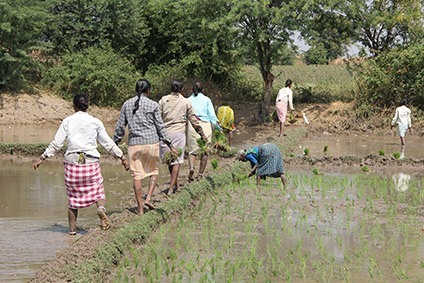
“Innovative” financing, including the setting up of “rice bonds”, are needed to support climate-friendly rice production and avert civil unrest, a report has claimed.
Earth Security Group, an agency promoting sustainable development, has put forward three “innovative financing solutions” to support climate-friendly rice production.

Discover B2B Marketing That Performs
Combine business intelligence and editorial excellence to reach engaged professionals across 36 leading media platforms.
Amid growth in so-called green bonds, debt instruments intended to finance climate and environmental projects, the London-based agency suggests rice bonds could be used to fund sustainable rice production and develop systems to reduce methane emissions.
Earth Security said rice is the source of 10% of global anthropogenic methane emissions, while cultivation of the commodity in one of the world’s major growing areas of south-east Asia accounts for up to 25-33% of the region’s methane emissions, and between 10-20% of its overall greenhouse gas emissions.
“A rice bond would enable a global rice processor, trader, or retailer to provide farmers with capital to transition to sustainable production, improve farming practices, increase yields and revenue, and become more resilient to climate risks,” Earth Security claims.
That’s the conclusion of the agency’s report – Financing Sustainable Rice for a Secure Future – published today (25 November) and supported by the UN Capital Development Programme (UNCDF), the Sustainable Rice Platform (SRP), commodities trader Phoenix Group, the World Business Council for Sustainable Development (WBCSD), and the Swiss Agency for Development and Cooperation (SDC).

US Tariffs are shifting - will you react or anticipate?
Don’t let policy changes catch you off guard. Stay proactive with real-time data and expert analysis.
By GlobalDataEarth Security said it “recommends leveraging international climate finance to attract private-sector investment for climate-smart rice production”.
Its chief executive Alejandro Litovsky added: “The failure of global food systems due to climate change is one of the biggest security challenges we face. A radical overhaul of existing rice production systems is needed in Asia – the epicentre of global rice production and consumption – as well as Africa, which is now also increasingly dependent on rice imports to ensure food security.
“Our report is a call to action for global impact investors to put ‘climate-smart’ rice-farming practices at the centre of their impact investment strategies, and for governments to use climate finance to attract private investment towards more resilient agriculture systems.”
Esther Pan Sloane, the head of partnerships, policy and communication at UNCDF, added that “sustainable rice has the potential to improve lives and livelihoods in many of the world’s poorest countries”.
And Tony Siantonas, a director for sustainable landscapes at WBCSD, said: “Mobilising innovative financing concepts – such as a rice bond – to support the sustainable transformation of rice-based landscapes is vital to achieving greater productivity, resource-efficiency and increased resilience to risks and climate variability.
“With its strategic collaboration with Earth Security Group and its participation in the Sustainable Rice Landscapes Initiative (SRLI), WBCSD is working to develop innovative, climate-smart, collaborative business and finance solutions that will transform the global food system.”





